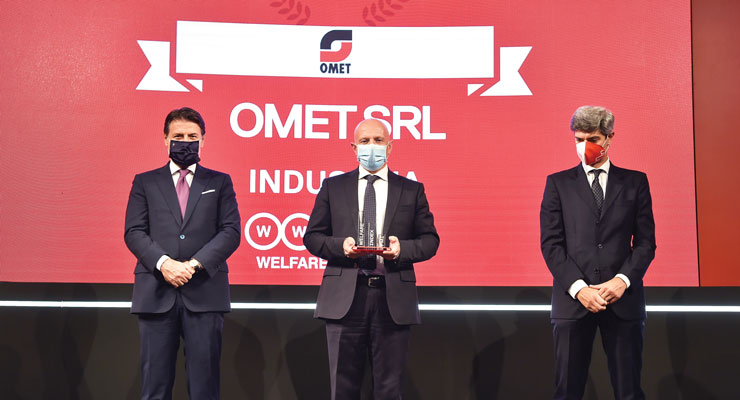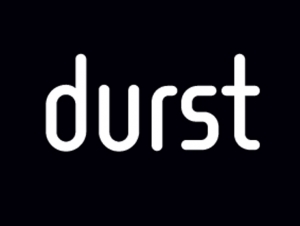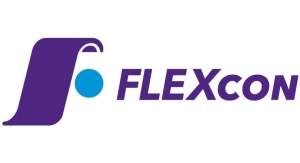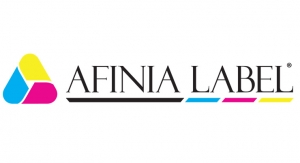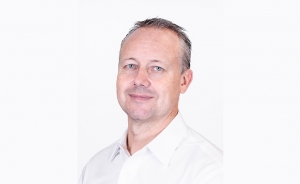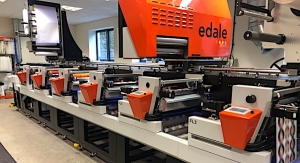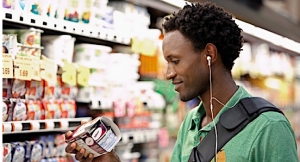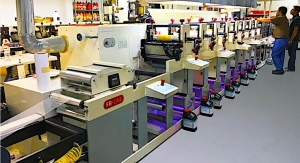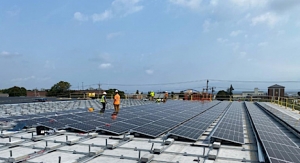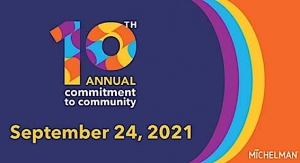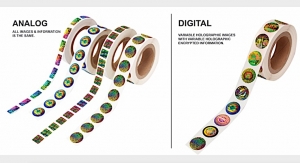John Penhallow11.12.20
Some people consider, wrongly, that Europe is the home of “real” environmentalists. This idea took a knock recently when Flexomaid, a subsidiary of US-based Peripheral Advanced Design Inc., decided to cut its losses by pulling its anilox cleaning systems out of the UK market.
Michael McGurn, UK sales director of PAD, explained, “PAD has developed the first, and only, ecologically friendly anilox cleaning system. Flexomaid uses air-stream technology to provide extraordinarily efficient, non-abrasive and contact-free anilox cleaning capabilities without harming our fragile ecosystem, but converters would still prefer to pour chemicals down the drain. In time, when the industry catches up with the technology then it can be released back into the UK market.”
But some UK-based companies have not relaxed their research into “greener” label solutions: one of them is Innovia, the BOPP specialist. This producer has launched Encore C45cn, described as the first carbon neutral BOPP label film. This film gives the added advantage, according to Innovia, of being equal in performance to a standard 50-micron film, thus giving a 10% material saving.
One man’s meat…
…is another man’s poison, or so the old saying goes. While the COVID pandemic is wreaking havoc on Europe’s economies, there are still some bright spots if you look for them. One has been reported by the UK contract packing association BCMPA. Inquiries for white label and private label goods are up 75% since the lockdown began (“white label” products are standard products made, packed and labeled by a contract packer; for non-standard products the term “private label” is used).
This good news concerns hand sanitizers (obviously) and cosmetic and household cleaning items (less obviously). The BCMPA seems a little unsure of why this is happening, attributing it to “several factors, including the emergence of smaller brands, and marketeers who have identified opportunities for new products and are often using e-commerce and online stores to bring them straight to market.” It is also possible that the pandemic has accelerated brand owners’ preference for outsourcing the messy business of mixing, packing and labeling their products.
Vaccine nationalism
Everyone knows about the race to produce a safe and effective anti-COVID vaccine. Most people are aware that their governments are placing huge orders for this so far non-existent product. Very few seem to be discussing the mind-boggling problems of producing, packing and, yes, labeling this elixir. Western governments have placed orders in excess of two billon doses.
Oxford/Astra Zeneca’s UK plant has announced that between now and the end of 2021 it will have capacity to make three billion doses. The United Kingdom so far is the world’s highest per-capita buyer, with 340 million purchased – around five doses for each citizen. The 27 European Union countries – which are buying vaccines as a group – and Japan have locked down hundreds of millions of doses of vaccines for themselves. The European Union, like the US, has preordered for just two doses per head of population but with options, in both cases, to double up. The reasons for this staggering over-ordering are not hard to find. With seven major pharmaceutical groups working flat out on vaccine development, no one knows which of them will win the jackpot – so governments are hedging their bets.
Most of the vaccines will probably be made in the US, with Britain, India, Norway and France making up the top five. Leading label converters like Reynders, Schreiner, Abbey and many others, all specialists in pharma labels, are sharpening their swords to make sure they get a share of this massive – and potentially lucrative – label market.
Chinese challenges
It is fashionable right now to be rude about everything Chinese, with even some heads of state among the jeer-leaders. So, who today would buy a Chinese label press? Answer: quite a lot of people. Take for example Etablissements Berg in Eastern France. This modest, family-run label converter has just invested in a semi-rotary offset press made by Weigang.
Alicia Berg went on record as saying: “Before deciding, we tested this press at an Italian converter. We found its wet offset technology could match digital and at an attractive price. We liked the print quality, particularly the hot foil, and also the setup speed.” Patrick Fraenkel, Weigang’s agent for France, says he has two more sales lined up.
Virus or no virus, it’s clear that the printing machinery business in China, on par with the economy, is very much up and running. At the time of writing this article, the All In Print China show in Shanghai has just closed, and a spokesperson for show organizer Tarsus has confirmed that Labelexpo South China will open on schedule in just a few weeks.
Far from being up and running, the expo business in Europe is closer to down and out, as one show after another is canceled or postponed.
Innovations, installations and ovations
Electrostatic booklet labels, used in particular for multilingual versioning, can’t be produced on most run-of-the-mill label presses. That is one of the reasons why France’s Imprimerie Michel Lata has invested in a Gallus Labelmaster 440. In addition to its nine print stations (eight flexo, one screen), the configuration has a booklet label unit and can print on both sides of the web in one pass. An inkjet module will be retrofitted in the near future. Michel Lata has lost business due to the virus, notably in cinema tickets, and will use the new Gallus line to develop tactile and braille labels, as well as booklets.
“Today we are celebrating stories of extraordinary entrepreneurs who focused their strategies on people, and this allowed them to be more competitive.” These were the words of Italy’s Prime Minister Giuseppe Conte at an award ceremony honoring, amongst others, label press manufacturer Omet. The awards were for welfare projects, both within the company and in the wider community. “Investing in welfare means investing in the future of the company and the territory,” said Omet’s CEO Antonio Bartesaghi. “We are proudly Italian and proudly linked to this territory, which has given us resources, skills, specialization, creativity and the ability to be competitive.”
Over 6,500 Italian companies were researched in order to pick the winners.
Where do we go from here?
Your correspondent always tries to end his news articles on a lighter, even humorous note. This is increasingly difficult as Europe’s economies, which looked brighter in the summer, now judder and brake under the hammer-blows of the pandemic’s “second wave.”
Already in the second quarter of this year, all the Euro-zone countries saw a double-digit fall in their GDP. For Britain, the year-on-year fall was a mind-blowing 22%. Having formally left the European Union, the UK is now “enjoying” a transition year in which to negotiate a new deal with the EU, which is its biggest trading partner. At the time of this writing, no deal is in sight, and the uncertainty is affecting investment decisions on both sides of the English Channel. There are even doubts about the functioning of the Channel Tunnel. The rumor that passengers will have to change trains at a new undersea station halfway between Calais and Dover is, however, a piece of fake news. We hope.
Michael McGurn, UK sales director of PAD, explained, “PAD has developed the first, and only, ecologically friendly anilox cleaning system. Flexomaid uses air-stream technology to provide extraordinarily efficient, non-abrasive and contact-free anilox cleaning capabilities without harming our fragile ecosystem, but converters would still prefer to pour chemicals down the drain. In time, when the industry catches up with the technology then it can be released back into the UK market.”
But some UK-based companies have not relaxed their research into “greener” label solutions: one of them is Innovia, the BOPP specialist. This producer has launched Encore C45cn, described as the first carbon neutral BOPP label film. This film gives the added advantage, according to Innovia, of being equal in performance to a standard 50-micron film, thus giving a 10% material saving.
One man’s meat…
…is another man’s poison, or so the old saying goes. While the COVID pandemic is wreaking havoc on Europe’s economies, there are still some bright spots if you look for them. One has been reported by the UK contract packing association BCMPA. Inquiries for white label and private label goods are up 75% since the lockdown began (“white label” products are standard products made, packed and labeled by a contract packer; for non-standard products the term “private label” is used).
This good news concerns hand sanitizers (obviously) and cosmetic and household cleaning items (less obviously). The BCMPA seems a little unsure of why this is happening, attributing it to “several factors, including the emergence of smaller brands, and marketeers who have identified opportunities for new products and are often using e-commerce and online stores to bring them straight to market.” It is also possible that the pandemic has accelerated brand owners’ preference for outsourcing the messy business of mixing, packing and labeling their products.
Vaccine nationalism
Everyone knows about the race to produce a safe and effective anti-COVID vaccine. Most people are aware that their governments are placing huge orders for this so far non-existent product. Very few seem to be discussing the mind-boggling problems of producing, packing and, yes, labeling this elixir. Western governments have placed orders in excess of two billon doses.
Oxford/Astra Zeneca’s UK plant has announced that between now and the end of 2021 it will have capacity to make three billion doses. The United Kingdom so far is the world’s highest per-capita buyer, with 340 million purchased – around five doses for each citizen. The 27 European Union countries – which are buying vaccines as a group – and Japan have locked down hundreds of millions of doses of vaccines for themselves. The European Union, like the US, has preordered for just two doses per head of population but with options, in both cases, to double up. The reasons for this staggering over-ordering are not hard to find. With seven major pharmaceutical groups working flat out on vaccine development, no one knows which of them will win the jackpot – so governments are hedging their bets.
Most of the vaccines will probably be made in the US, with Britain, India, Norway and France making up the top five. Leading label converters like Reynders, Schreiner, Abbey and many others, all specialists in pharma labels, are sharpening their swords to make sure they get a share of this massive – and potentially lucrative – label market.
Chinese challenges
It is fashionable right now to be rude about everything Chinese, with even some heads of state among the jeer-leaders. So, who today would buy a Chinese label press? Answer: quite a lot of people. Take for example Etablissements Berg in Eastern France. This modest, family-run label converter has just invested in a semi-rotary offset press made by Weigang.
Alicia Berg went on record as saying: “Before deciding, we tested this press at an Italian converter. We found its wet offset technology could match digital and at an attractive price. We liked the print quality, particularly the hot foil, and also the setup speed.” Patrick Fraenkel, Weigang’s agent for France, says he has two more sales lined up.
Virus or no virus, it’s clear that the printing machinery business in China, on par with the economy, is very much up and running. At the time of writing this article, the All In Print China show in Shanghai has just closed, and a spokesperson for show organizer Tarsus has confirmed that Labelexpo South China will open on schedule in just a few weeks.
Far from being up and running, the expo business in Europe is closer to down and out, as one show after another is canceled or postponed.
Innovations, installations and ovations
Electrostatic booklet labels, used in particular for multilingual versioning, can’t be produced on most run-of-the-mill label presses. That is one of the reasons why France’s Imprimerie Michel Lata has invested in a Gallus Labelmaster 440. In addition to its nine print stations (eight flexo, one screen), the configuration has a booklet label unit and can print on both sides of the web in one pass. An inkjet module will be retrofitted in the near future. Michel Lata has lost business due to the virus, notably in cinema tickets, and will use the new Gallus line to develop tactile and braille labels, as well as booklets.
“Today we are celebrating stories of extraordinary entrepreneurs who focused their strategies on people, and this allowed them to be more competitive.” These were the words of Italy’s Prime Minister Giuseppe Conte at an award ceremony honoring, amongst others, label press manufacturer Omet. The awards were for welfare projects, both within the company and in the wider community. “Investing in welfare means investing in the future of the company and the territory,” said Omet’s CEO Antonio Bartesaghi. “We are proudly Italian and proudly linked to this territory, which has given us resources, skills, specialization, creativity and the ability to be competitive.”
Over 6,500 Italian companies were researched in order to pick the winners.
Where do we go from here?
Your correspondent always tries to end his news articles on a lighter, even humorous note. This is increasingly difficult as Europe’s economies, which looked brighter in the summer, now judder and brake under the hammer-blows of the pandemic’s “second wave.”
Already in the second quarter of this year, all the Euro-zone countries saw a double-digit fall in their GDP. For Britain, the year-on-year fall was a mind-blowing 22%. Having formally left the European Union, the UK is now “enjoying” a transition year in which to negotiate a new deal with the EU, which is its biggest trading partner. At the time of this writing, no deal is in sight, and the uncertainty is affecting investment decisions on both sides of the English Channel. There are even doubts about the functioning of the Channel Tunnel. The rumor that passengers will have to change trains at a new undersea station halfway between Calais and Dover is, however, a piece of fake news. We hope.

